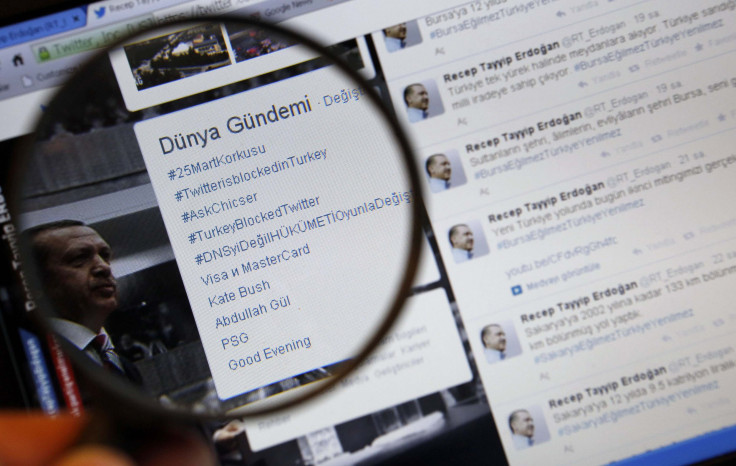Turkish Prime Minister Recep Tayyip Erdogan And Government Block Twitter Ahead Of Elections, Reducing Tweets By 50%

Twitter users in Turkey have been finding ways around the government shutdown of the social media site imposed last week, but the volume of tweets has now dropped to less than half of what it was before, as the government blocked some of those additional channels in recent days, Hurriyet Daily reported Wednesday.
Embattled Prime Minister Recep Tayyip Erdoğan and his Islamic AKP party blocked access to more than 700 pieces of illicit content in the past week since imposing the Twitter (NYSE:TWTR) ban, viewed by many as yet another attempt to silence the opposition ahead of the highly anticipated municipal elections set for March 30.
The prime minister needs a victory in the upcoming local election because he and his moderate party are embroiled in one of the country's biggest corruption scandals. In December, police arrested the sons of three cabinet ministers as well as dozens of others on corruption charges.
A significant number of Turkey’s 12 million Twitter users have taken to the social media platform to criticize the government and its increased authoritarian rule. Erdoğan, on the other hand, alleges that Twitter, as well as Facebook Inc. (NASDAQ:FB) and YouTube, are being employed to conspire against him.
“Twitter and Facebook have also been used to air corruption allegations against the government, hurting Erdoğan's credibility and sullying his political reputation,” Soner Cagaptay of the Washington Institute for Near East Policy, a think tank, said in a statement.
Cagaptay added that while polls suggest AKP is still likely to win the local elections, “they also indicate that the AKP's popularity may be slipping as a result of ongoing and virtual anti-government campaigns.”
Last summer’s harsh crackdown on protesters and new restrictive laws on freedom of speech have undermined the popularity Erdoğan has enjoyed since taking office in November 2002. In the six election cycles since, his party has done increasingly well, but March 30 could end that streak, Cagaptay said.
This is not the first time Turkey’s government restricted access to the Internet. In mid-February, leaked wiretaps and incriminating recordings of high-ranking Turkish government officials circulated on the social media platforms. In response, Turkey’s parliament implemented a new law that allowed authorities to block Web pages or entire websites without a court order while hoping to defend the “sanctity of personal privacy.” A recording of what some claim is Erdoğan’s voice was also leaked. If verified, that recording could incriminate him.
The outcome of this election is crucial because it will set the tone for the subsequent presidential (August 2014) and parliamentary (2015) elections. The elections next week could indicate whether or not the opposition has a chance to rebound.
© Copyright IBTimes 2024. All rights reserved.












